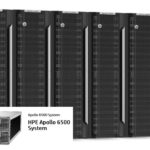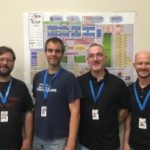Today SGI announced a significant investment in extreme scale software research at the Irish Centre for High-End Computing (ICHEC), a top European center. The investment highlights the commitment of SGI to the European software research community. These resources, including SGI application software and supercomputing hardware expertise, will assist scientists as they explore issues related to climate change, weather forecasting, and environmental research among many other topics.
Archives for August 2016
Simulating the Earliest Generations of Galaxies with Enzo and Blue Waters
“Galaxies are complex—many physical processes operate simultaneously, and over a huge range of scales in space and time. As a result, accurately modeling the formation and evolution of galaxies over the lifetime of the universe presents tremendous technical challenges. In this talk I will describe some of the important unanswered questions regarding galaxy formation, discuss in general terms how we simulate the formation of galaxies on a computer, and present simulations (and accompanying published results) that the Enzo collaboration has recently done on the Blue Waters supercomputer. In particular, I will focus on the transition from metal-free to metal-enriched star formation in the universe, as well as the luminosity function of the earliest generations of galaxies and how we might observe it with the upcoming James Webb Space Telescope.”
OpenHPC – Community Building Blocks for HPC Systems
Karl Schulz from Intel presented this talk at the 4th Annual MVAPICH User Group meeting. “Today, many supercomputing sites spend considerable effort aggregating a large suite of open-source projects on top of their chosen base Linux distribution in order to provide a capable HPC environment for their users. This presentation will introduce a new, open-source HPC community (OpenHPC) that is focused on providing HPC-centric package builds for a variety of common building-blocks in an effort to minimize duplication, implement integration testing to gain validation confidence, incorporate ongoing novel R&D efforts, and provide a platform to share configuration recipes from a variety of sites.”
HPE Solutions for Deep Learning
Coming in the second half of 2016: The HPE Apollo 6500 System provides the tools and the confidence to deliver high performance computing (HPC) innovation. The system consists of three key elements: The HPE ProLiant XL270 Gen9 Server tray, the HPE Apollo 6500 Chassis, and the HPE Apollo 6000 Power Shelf. Although final configurations and performance are not yet available, the system appears capable of delivering over 40 teraflop/s double precision, and significantly more in single or half precision modes.
Radio Free HPC Looks at Alternative Processors for High Performance Computing
In this podcast, the Radio Free HPC team looks at why it’s so difficult for new processor architectures to gain traction in HPC and the datacenter. Plus, we introduce a new regular feature for our show: The Catch of the Week.
There’s Still Time to Show Why HPC Matters in the SC16 Impact Showcase
SC16 has extended the application deadline for its Impact Showcase, a forum designed to show attendees why HPC Matters in the real world. Submissions are now due Sept. 15.
SCinet Preps World’s Fastest Network Infrastructure at SC16
Over at the SC16 Blog, JP Vetters writes that planning for the SCinet high-bandwidth conference network is a multiyear process. “The success of any large conference depends on the, often unseen, hard work of many. During the last quarter century, the SCinet team has strived to perfect its routine so that conference-goers can experience a smoothly run Show.”
Extreme-scale Graph Analysis on Blue Waters
George Slota presented this talk at the Blue Waters Symposium. “In recent years, many graph processing frameworks have been introduced with the goal to simplify analysis of real-world graphs on commodity hardware. However, these popular frameworks lack scalability to modern massive-scale datasets. This work introduces a methodology for graph processing on distributed HPC systems that is simple to implement, generalizable to broad classes of graph algorithms, and scales to systems with hundreds of thousands of cores and graphs of billions of vertices and trillions of edges.”
Job of the Week: Data Operations Specialist at the Simons Foundation
“The Simons Foundation is beginning a new computational science organization called the Flatiron Institute. Flatiron will seek to explore challenging science problems in astrophysics, biology and chemistry. Computational science techniques involve processing and simulation activities and large-scale data analysis. This position is intended to help manage and fully exploit the data and storage resources at Flatiron to further the scientific mission.”













